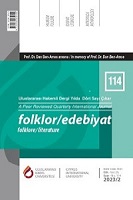Lament of Medea: A Kinesthetic Performance
Lament of Medea: A Kinesthetic Performance
Author(s): Fulya KincalSubject(s): Gender Studies, Aesthetics, Gender history, Sociology of Culture, Theory of Literature, Sociology of Literature
Published by: Uluslararası Kıbrıs Üniversitesi
Keywords: Lament; subjectivity; Medea;
Summary/Abstract: This study shows how the language of lament liberates a woman from a socially constructed murderous identity. By using stylistic analysis and mainly focusing on the method of singing lament, this article shows the possibility of undermining the socially constructed identity of the ancient Greek heroine Medea. As the 19th-century thoughts in England about women acquired the most exacerbated misogynist overtones, the problem for the women artists was a desperate search for a new identity and, thus, for language. Two crucial Victorian poets, Amy Levy and Augusta Webster, turned to Greek mythology to explore the collective cultural constructions, recognized the power of lament as a literary device and used it to provide a new perspective to ancient Greek playwright Euripides’ Medea. They formulated their poem using the linguistic and contextual rules of lamentation, such as interrogative questions, alliteration, assonance, phonetic structuring, highly metaphorical language, wordplay, parallelism and antithesis. Due to the figurative devices and deviant use of language, they made the reader witness the melancholy and mourning of heroin. They got the reader to think that they should reconsider Medea. Thus, this study focuses on the poetic language of Levy and Webster to provide a different angle to the concept of identity and give the reader a better sense of what Medea is all about. This article provides critical insight into the power of the language of lament in the deconstruction of rigid and stable identity. Moreover, it shows the critical role that language and the performance of lament play in the construction of the self-perception of the speaking subject.
Journal: Folklor/Edebiyat
- Issue Year: 29/2023
- Issue No: 114
- Page Range: 551-566
- Page Count: 15
- Language: English

